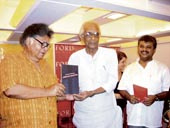 |
| Sunil Gangopadhyay and Nirendranath Chakraborty at the launch of Jesus of Calcutta and (below) Amit Varma with his book My Friend Sancho. Picture by Bishwarup Dutta |
 |
Nirendranath Chakraborty’s Kolkatar Jishu has been translated into English, but it will never draw the same appreciation from a Bengali reader that the original book of poems inevitably does each time it is read. And this was underlined even further at the launch of the translation — titled Jesus of Calcutta — by Bhabani Prasad Chattopadhyay, a teacher of English who loves poetry.
Chakraborty read his celebrated poem that gives the volume its name at Oxford Bookstore on June 2. It was a sweltering evening, thanks to an extended power cut in the area, and things became worse with the constant hum of conversation and the people moving in and out of the bookstore’s split level. But even in the midst of such confusion, the poetry held people in thrall.
When this was followed by Rita Bhimani’s reading of the translation, the spell was broken. The stark difference between the original and the translation was apparent. Perhaps it would have been better if the original was not read with the translation, at least for the future of such translations! But for all those who do not know Bengali, translation, good or bad, is the only hope.
Along with Kolkatar Jishu was launched the translation of Prabal Kumar Basu’s Chhata Sankranta Sabkichhu.
Writer Sunil Gangopadhyay, present at the launch, said: “Nirenda’s book is known to every educated Bengali. But it is for the people who do not read Bengali the translation is needed. While in China, there is Chinese literature, in Japan, Japanese literature, in Vietnam, Vietnamese literature, in India there is no such thing as Indian literature. However, as Nehru, in his atypical way had said: ‘Indian literature is one that is written in many languages’. ”
Love and a lizard
Amit Varma’s My Friend Sancho launched recently at Oxford Bookstore claims to bridge the gap between literary and popular fiction. The debut novel of this popular blogger and journalist revolves around a Mumbai-based Bengali crime reporter, Abir Ganguly, who falls in love with the daughter of a murdered gangster. The underworld connection, says Varma, isn’t forced. “It’s a way of life in Mumbai. Even the cable operator has an underworld connection,” he jokes.
Abir is commissioned to write a feature on a victim of an encounter killing. He meets the dead man’s daughter Muneeza (referred to as Sancho later) and a friendship develops between the two.
It doesn’t matter if he’s the cynical journalist and Muneeza is a simple girl who “travels in buses”. The book also features a jealous lizard who occupies space in Abir’s flat and doesn’t like the attention he starts heaping on the pretty girl. With dead gangsters, corrupt cops and a hardened journalist who suddenly discovers a softer side to himself, he hopes it’s “a book that entertains as well as tells you a little about yourself”. The readers will find out.
Self-help
Dewakar Goel wears many hats. The general manager (personnel and administration) of southern region, Airports Authority of India, balances his work with a love of writing. He has penned three collections of poetry, a book on management and a self-help book, with another on the way.
The former general manager of Calcutta airport was passing through the city, on his way to a conference on aviation in Bhubaneswar.
His first self-help book Living a Stressful Life With Joy was on the ways of dealing with stress in several professions. His upcoming book, titled Endless Travel, shows the right way to plan one’s life after 50. “This is the time to explore avenues untrod earlier because of other pressures,” says Goel, who turned 50 la











